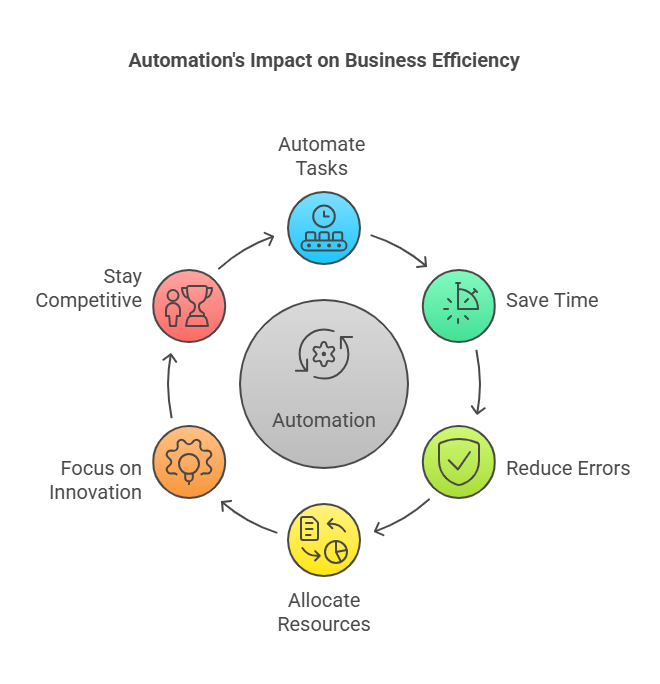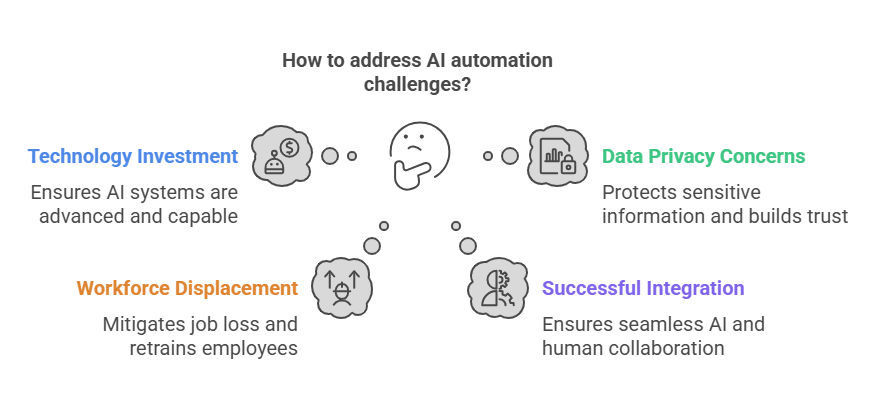Introduction
In a world dominated by innovation, AI automation has emerged as the driving force behind the future of work. Industries are undergoing monumental changes as machines and algorithms take over repetitive tasks, streamline processes, and enable data-driven decisions.
While the benefits are immense, this transformation brings its own set of challenges. To thrive in this evolving landscape, businesses must embrace AI-powered automation and rethink their workflows to maximize potential.
The Problem – Why Traditional Workflows Are Failing
Traditional workflows are struggling to keep up with the demands of the digital era. Here are key reasons why:
- Inefficiency in Manual Processes: Manual tasks like data entry and resource allocation are time-consuming and prone to errors, resulting in delays and wasted resources.
- High Operational Costs: Labor-intensive processes inflate operational expenses, leaving companies with fewer resources for growth.
- Limited Scalability: Traditional systems often fail to adapt to growth. Businesses hit bottlenecks in scaling operations without significant investment.
Traditional systems often fail to adapt to growth. Businesses hit bottlenecks in scaling operations without significant investment.
The Agitation – The Need for Automation in Today’s World
The demands of the global economy and rising competition are pressing industries to find better ways to work. Companies that resist change risk falling behind as others embrace AI automation.
- Competitive Pressure: Businesses leveraging AI-powered tools gain faster insights, optimize processes, and achieve higher productivity, leaving traditional companies trailing.
- Workforce Evolution: As the workforce shifts, companies must redefine roles and train employees to work alongside intelligent systems.
- The Role of AI in Industry Transformation: From predictive analytics to robotic process automation (RPA), AI technologies are not just enablers—they’re becoming integral to daily operations.

The Solution – How AI Automation Is Transforming Industries
- Enhanced Efficiency Across Sectors: AI automation is redefining how industries function by eliminating inefficiencies and ensuring smoother workflows.
- Cost Reduction Through Intelligent Systems: Smart algorithms reduce operating expenses by automating repetitive tasks and enabling resource optimization.
- Scalability with AI-Powered Processes: AI automation provides the scalability that traditional methods lack. Businesses can expand operations with minimal investment.
Industries Embracing AI Automation
- Healthcare: AI is transforming healthcare by improving patient diagnostics, enabling faster research, and streamlining administrative tasks.
- Retail and E-commerce: AI automation is revolutionizing customer experience, inventory management, and personalized marketing strategies.
- Manufacturing: With technologies like predictive maintenance and autonomous robotics, AI is optimizing production lines and minimizing downtime.
- Finance: Financial institutions are leveraging AI for fraud detection, investment predictions, and streamlined customer service.
Challenges in Adopting AI Automation
- Skill Gap: Adopting AI automation requires skilled professionals to manage and maintain intelligent systems.
- High Initial Investment: Despite long-term savings, the upfront costs of implementing AI can be a hurdle for startups and small businesses.
- Ethical Concerns: Concerns around data privacy, job displacement, and algorithm biases require careful consideration as industries embrace AI.

Preparing Your Business for the AI Future
- Upskilling Employees: Invest in training programs to equip your workforce with the skills needed to collaborate effectively with AI systems.
- Custom AI Solutions: Choose tailored automation tools that align with your industry-specific needs for better ROI.
- Agile Adaptation: Adopt an agile mindset to stay ahead in the rapidly changing world of automation and technology.
Conclusion
The future of work is here, and AI automation is at its core. From reducing costs to optimizing processes, AI is reshaping industries in unimaginable ways. As businesses adapt to this change, the key lies in harnessing automation while upskilling employees to drive innovation.
At CodePaper, we’re committed to empowering businesses with custom AI solutions that make a difference. Are you ready to embrace the AI-driven future?
🚀 Future-Proof Your Business with AI!
Ready to innovate and scale effortlessly with AI?
👉 Get Your Free AI Audit Today!
or
📞 Speak with an Expert Now and Unlock Smarter, Faster Growth!
FAQs
Q: What does the “future of work” mean with AI automation?
The “future of work”** refers to the evolving nature of jobs, skills, and work environments due to emerging technologies like AI automation. It involves shifting repetitive tasks to machines, enhancing decision-making, and enabling more flexible, efficient, and intelligent workplaces.
Q: How is AI automation transforming industries in 2025?
In 2025, AI automation is revolutionizing industries by:
- Speeding up operations
- Reducing human error
- Enhancing personalization
- Improving customer service
- Boosting productivity and profitability
From healthcare to manufacturing and retail, almost every industry is adopting AI to stay competitive.
Q: What are some real-world examples of AI in the workplace?
Retail: AI-driven chatbots and inventory automation
Finance: Automated fraud detection and robot-advisors
Healthcare: AI-assisted diagnostics and patient record management
Marketing: Predictive analytics and content automation
Logistics: Smart routing and delivery tracking
Q: How can employees prepare for AI-driven work environments?
To stay relevant, professionals should:
- Learn digital and analytical skills
- Embrace continuous learning
- Adapt to AI collaboration tools
- Focus on creativity, critical thinking, and emotional intelligence
Soft skills + tech skills will define the workforce of the future.
Q: How can AI improve employee productivity?
By automating repetitive tasks, AI allows employees to focus on strategic, creative, and human-centric work, which leads to:
- Higher engagement
- Faster output
- Smarter decision-making
- Better work-life balance

